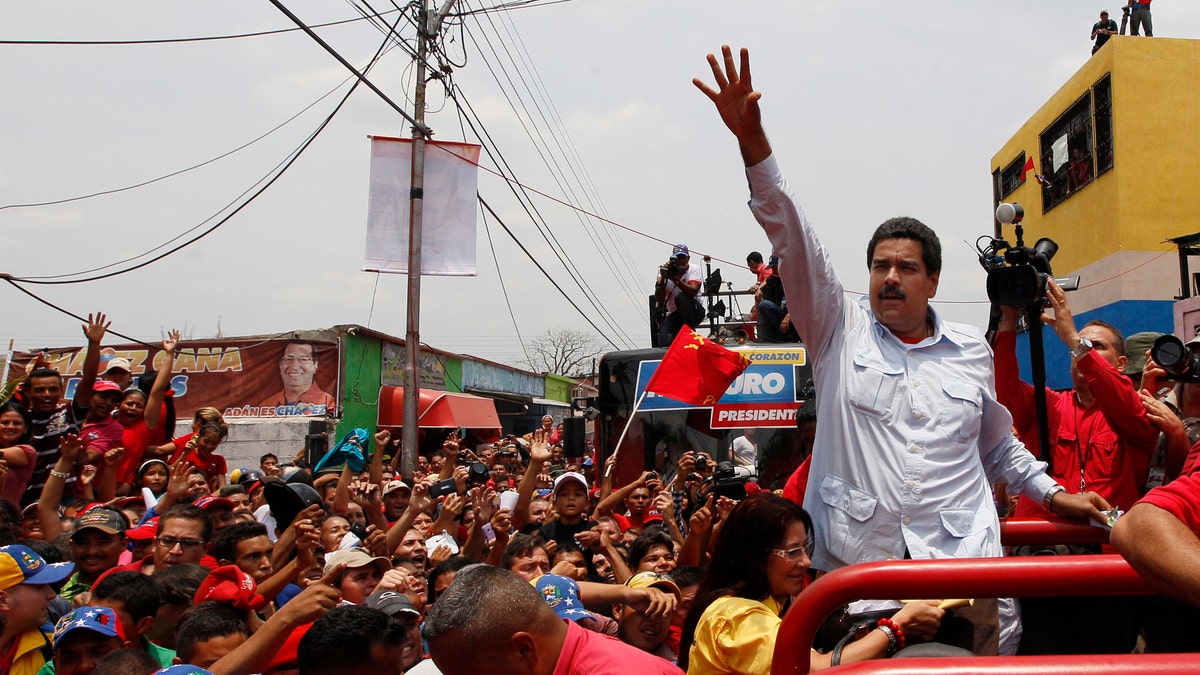
Venezuela's interim President Nicolas Maduro waves to supporters from the top of a vehicle as he campaigns in a caravan from Sabaneta to Barinas, in Sabaneta, Venezuela, Tuesday, April 2, 2013. A former union leader and bus driver, Maduro is competing against opposition leader Henrique Capriles in the April 14 presidential election. Invoking the late President Hugo Chavez during a televised speech on Tuesday, Maduro declared: "This victory will belong to our commander!" (AP Photo/Ariana Cubillos) (AP2013)
CARACAS, Venezuela – Venezuelan President Nicolás Maduro accused the United States of barring him from its airspace – and officials in the country called it an act of aggression.
But American officials denied he was forbidden from flying in U.S. airspace, claiming he didn’t give enough notice for his trip so it wasn’t immediately approved. But, the U.S., it doesn’t mean the request was denied.
The U.S. Embassy in Caracas said that Venezuela had requested diplomatic clearance with one-day advance notice, while such clearances usually require three days of notice. The statement also said the plane in question wasn't a state aircraft, which is required for diplomatic clearance.
The statement said that "although the request was not properly submitted, US authorities worked with Venezuelan officials at the Venezuelan embassy to resolve the issue." The statement did not say whether the request had originally been turned down.
Venezuelan officials had denounced the U.S. Thursday for denying Maduro clearance on his way to China. Maduro needed the clearance to fly over Puerto Rico, a U.S. commonwealth.
Calixto Ortega, the highest-ranking Venezuelan diplomat in the United States, claims the U.S. State Department initially denied Maduro from flying over U.S. airspace "in writing" then backtracked on its decision.
Samuel Moncada, Venezuela’s Ambassador to the United Nations, said the U.S. has refused to grant visas to members of the Venezuelan delegation so they could participate in the UN General Assembly next week.
In a letter to UN Secretary-General Ban Ki-moon, Moncada says the U.S. is “deliberately delaying the approval of entry permits” and is trying “to create logistical barriers ... [to] impede the visit.”
Allied leftist President Evo Morales of Bolivia, whose plane was forced down in Austria in July after leaving Moscow, presumably because U.S. intelligence leader Edward Snowden was suspected to have been aboard, also reacted angrily.
He said without offering further details that the United States should prepare to face "international legal action for crimes against humanity."
Venezuela and Bolivia have had strained relations with the U.S. in recent years.
Washington has been without an ambassador in Venezuela since 2010 and Morales kicked out the U.S. ambassador and the Drug Enforcement Administration in 2008, accusing them of inciting the opposition.
Maduro, the hand-picked successor of the late Hugo Chávez, has repeatedly accused the United States of conspiring to overthrow his government, although without substantiating the claims.
He narrowly won the presidency in April in elections the opposition claims were stolen through fraud and he presides over a government that human rights and press freedom groups say is among the most repressive in the Western Hemisphere.
Maduro's Venezuela is a staunch supporter of Syria and an ally as well of Russia and Iran. China has in recent years become a close commercial associate.
The United States also considers Venezuela a major drug-transiting country, where cocaine originating in Colombia heads north toward the United States and east to Africa and Europe.
Based on reporting by The Associated Press.
Follow us on twitter.com/foxnewslatino
Like us at facebook.com/foxnewslatino
